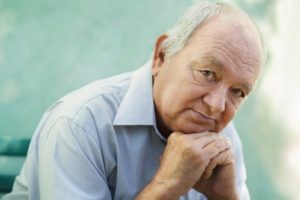 Shingles vaccine effectiveness in seniors has been found to be influenced by depression diagnosis and treatment. Shingles is caused by the herpes zoster virus and can be a painful condition in seniors. The latest findings suggest the vaccine may not be effective in those with untreated depression.
Shingles vaccine effectiveness in seniors has been found to be influenced by depression diagnosis and treatment. Shingles is caused by the herpes zoster virus and can be a painful condition in seniors. The latest findings suggest the vaccine may not be effective in those with untreated depression.
For the study, the researchers measured immune responses to the shingles vaccine among 40 seniors, all with major depressive disorder, and results were compared with 52 age-matched control patients. Measurements were taken at baseline, six weeks, 12 months, and two years after the vaccine was administered.
Advertisement
Untreated depression patients were found to have lower cell-mediated immunity to the vaccine, causing them to have a lower response, compared to depressed patients receiving treatment and those without depression. The findings reveal that untreated depression patients are not well protected against shingles even when they receive the vaccine.
Although further research is required to better understand how depression treatment increases effectiveness of the shingles vaccine, researchers speculate that maybe depressed patients who receive treatment can improve effectiveness of other vaccinations as well. Lead researcher Dr. Michael Irwin concluded, “Efforts are also needed to identify and diagnose depressed elderly patients who might benefit from either a more potent vaccine or a multi-dose vaccination schedule.”
Treatment options for depression in seniors
Depression isn’t simply a mental disorder. It can also have a physical toll on a person like contributing to sleep problems, negatively impacting the heart, and weakening a person’s immune system, thus lowering their ability to fight off illness. Depression is particularly harmful in seniors where it often goes undiagnosed because it can present itself as other health conditions, or worse yet, because patients don’t actively seek help for their mood disorder as they are afraid or embarrassed.
Treating depression is crucial as it not only improves a person’s mental state, but it can boost their overall wellbeing, too.
For seniors specifically, there are numerous depression treatment options, including:
- Antidepressant medications
- Electroconvulsive therapy, which is useful in those who do not respond to medications and who have melancholic and psychotic depression
- Psychotherapy
- Physical exercise
- Musical therapy
Depending on other comorbid conditions in a patient, antidepressants may not be a safe treatment option as they can interact with other medications. Therefore, it’s important to work closely with your doctor to ensure that drug interactions are avoided as much as possible.
In order to improve your depression, the first step is to speak up about it. This can start with family and friends or visiting your doctor directly. Unless your doctor is aware of what you are feeling, they cannot create a specific treatment plan for you in order to help treat depression.
Related Reading:
Anxiety, depression after heart attack more common in women than men
Anxiety and depression after heart attack are more common in women than men. Professor Pranas Serpytis said, “The World Health Organization predicts that by 2020 depression will be the second leading cause of disability and mortality in the world, surpassed only by ischemic heart disease.” Continue reading…
Advertisement
Insomnia and nightmares fuel depression: Study
A study of firefighters has found how insomnia and nightmares can fuel depression by impairing the ability to access and influence emotion regulation strategies properly. A high percentage of participants reported clinical insomnia symptoms, depression symptoms, and nightmare problems. Continue reading…
Sources:
http://www.idsociety.org/2013_Shingles_Vaccine_Depression/
http://cid.oxfordjournals.org/content/early/2013/02/12/cid.cis1208.full
http://www.blackdoginstitute.org.au/docs/DepressioninOlderPeople.pdf
